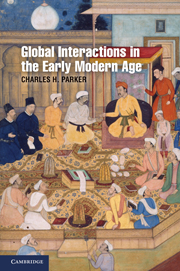Book contents
- Frontmatter
- Contents
- Maps
- Acknowledgments
- Global Interactions in the Early Modern Age, 1400–1800
- Introduction: The Global Integration of Space
- 1 European States and Overseas Empires
- 2 Asian States and Territorial Empires
- 3 International Markets and Global Exchange Networks
- 4 The Movement of Peoples and Diffusion of Cultures
- 5 The Formation of New Demographic and Ecological Structures
- 6 The Transmission of Religion and Culture
- Conclusion: Converging Destinies
- Notes
- Index
- References
4 - The Movement of Peoples and Diffusion of Cultures
Published online by Cambridge University Press: 05 June 2012
- Frontmatter
- Contents
- Maps
- Acknowledgments
- Global Interactions in the Early Modern Age, 1400–1800
- Introduction: The Global Integration of Space
- 1 European States and Overseas Empires
- 2 Asian States and Territorial Empires
- 3 International Markets and Global Exchange Networks
- 4 The Movement of Peoples and Diffusion of Cultures
- 5 The Formation of New Demographic and Ecological Structures
- 6 The Transmission of Religion and Culture
- Conclusion: Converging Destinies
- Notes
- Index
- References
Summary
Today, one of the most striking consequences of globalization is the wide-reaching movement of peoples and their cultures around the planet. A person can virtually encounter the world – see distinctive attire, smell exotic cuisine, and hear all sorts of mysterious verbal cadences – on a stroll through almost any big city. In terms of language, a survey conducted in the United Kingdom in 2005 found that at least 104 languages were spoken among school-aged children in Scotland, 98 languages in Wales, and 300 in England. In London alone, one can hear 196 different spoken languages. No doubt, studies of New York, Paris, Buenos Aires, Tokyo, Jakarta, and a host of other cities would yield comparable statistics. At no other time in history have so many different people resettled in so many different lands.
The roots of modern migration patterns, and ultimately cultural diffusion in the twenty-first century, extend back to the substantial movements of peoples in the early modern age. Empire building in America, Siberia, and central Asia spawned large-scale migration movements that repopulated these world regions. Africans and Europeans mixed with native Americans in the western hemisphere, Russians and Siberian peoples remade northern Asia, and Chinese emigrants reshaped large areas of central and southeast Asia. As different ethnic communities established new homes in new places, various peoples interacted with one another on an extensive scale for the first time and thereby created new societies.
- Type
- Chapter
- Information
- Global Interactions in the Early Modern Age, 1400–1800 , pp. 110 - 145Publisher: Cambridge University PressPrint publication year: 2010

